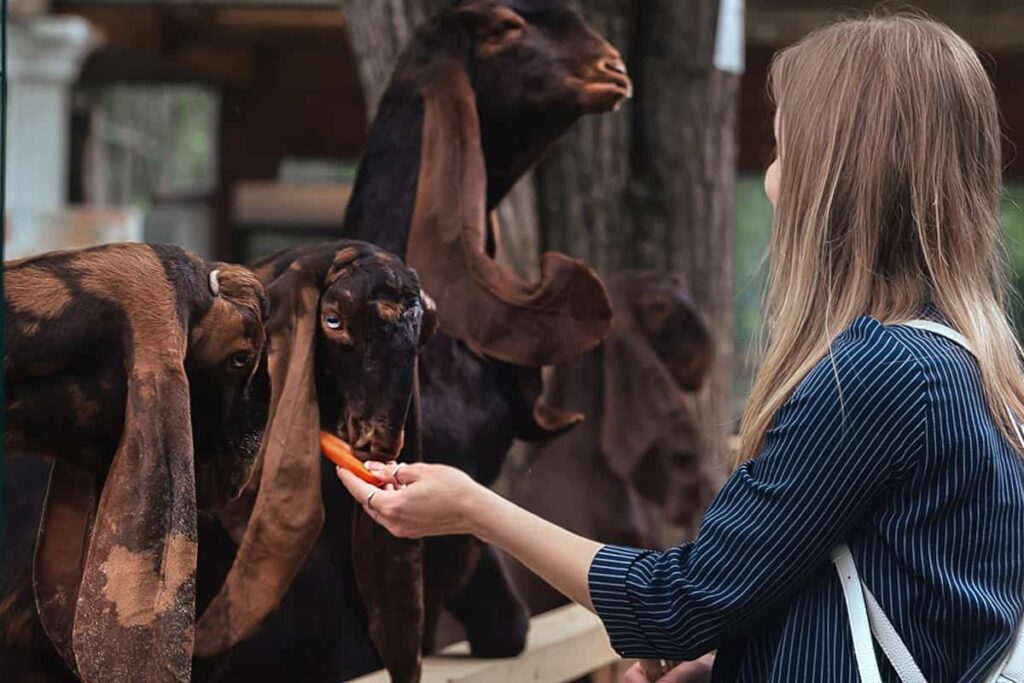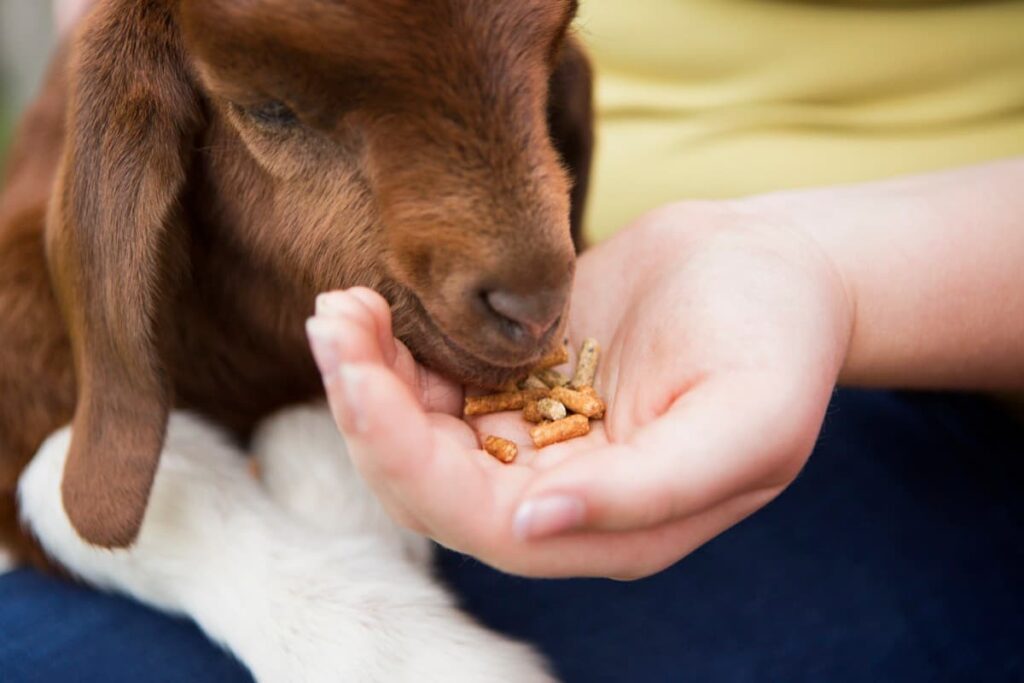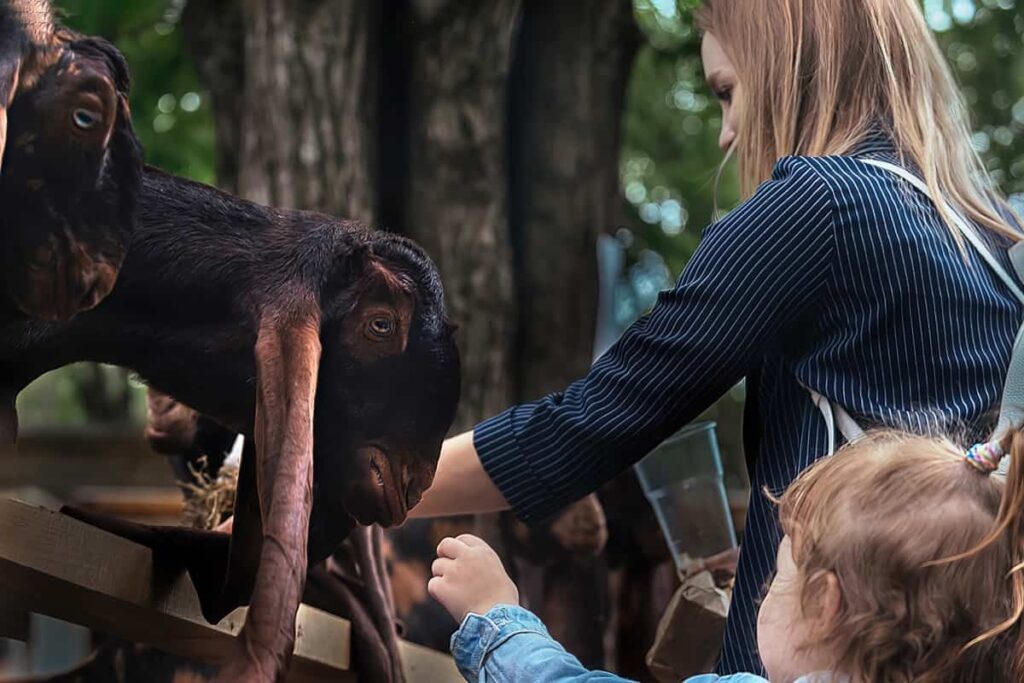Damascus goats are now bred worldwide for commercial purposes. Farming Damascus goats offers various benefits to farmers, making it profitable. Damascus goats, also known as Shami goats, are a multi-purpose breed of goat originating from Syria and other Near East countries. Farming Damascus goats can be a profitable venture if done correctly.

Damascus Goat Farming Information
Housing Requirement for Damascus Goats
- The shelter must be spacious enough for the goats to move around comfortably, with separate areas designated for feeding and sleeping. The shelter should also have proper ventilation and ample light.
- You should use sturdy materials such as brick or concrete for construction. This will ensure the shelter remains strong and durable in all weather conditions. Additionally, the shelter must be kept clean at all times to minimize the risk of infections.
- Proper housing ensures the good health and growth of your Damascus goats while minimizing any potential risks they may face in their environment.
Characteristics of Damascus Goats
- Damascus goats have a distinctive appearance with long ears that hang downwards and curved horns.
- These goats are well known for their adaptability to different climates and terrain types. Damascus goats have gained popularity due to their high milk production capabilities.
- In addition to milk production, Damascus goats are also raised for meat production due to their fast growth rate and ability to gain weight quickly compared to other breeds of goats.
- Male Damascus goats can weigh between 70-90 kg, while females generally weigh between 50-60 kg.
- Damascus Goats offer many benefits making them an excellent option for livestock farming ventures worldwide.
Feeding Tips for Damascus Goats
- Feeding plays a crucial role in Damascus goats’ overall health and productivity. Providing them with a balanced diet that meets their nutritional requirements is important.
- Hay and pasture grass are the primary sources of food for these goats. They should have continuous access to fresh, clean water as well.
- It’s important not to overfeed your Damascus goats, which can lead to obesity and related health issues. On the other hand, underfeeding can result in stunted growth and poor milk production.
- It’s also essential to ensure that any feed given is free from mold or contaminants that may cause illness in your herd. Regular salt licks will help ensure they receive adequate minerals for optimal health. You’ll keep them healthy and happy by ensuring they have plenty of hay or pasture grass and various supplements.
In case you missed it: Innovative Housing and Shelter Designs for Profitable Goat Farming

Damascus Goats Milk and Meat Production
These goats are known for their excellent milk yield, with an average of 1.9 kg per day and a total milk yield reaching up to 570 kg in one lactation period. In addition to its nutritional value and culinary versatility, the demand for goat milk is continuously growing in the market due to its numerous health benefits.
These factors, combined with the high yield potential of Damascus goats’ milk production capabilities, make them an attractive investment for any farmer looking into commercial goat farming. Aside from milk production, the meat produced by Damascus goats also fetches high returns to growers as they have a high growth rate and gain weight sooner than other breeds. The leather produced from their hides is also of good quality and has considerable demand in the market.
Breeding Damascus Goats
It is an essential aspect of goat farming. Generally, natural breeding is preferred among farmers as it is cost-effective and results in healthy offspring. However, with the advancements in modern scientific techniques, commercial growers are also carrying out induced breeding. Proper breeding management enhances Damascus goats’ growth potential while ensuring good health outcomes that result in successful yields for farmers.
How to Care for a Damascus Goat?
- Their living conditions should be clean and spacious. Please provide them with a well-ventilated, dry, and draft-free shelter.
- Regular grooming helps keep Damascus goats healthy and happy. This includes trimming hooves as needed, brushing their coats regularly, and checking for signs of illness or injury.
- Establishing a relationship with your veterinarian is also important in case any health issues arise. Vaccinations against common diseases like tetanus can help prevent illnesses from spreading throughout your herd.
- The most important aspect of caring for these goats is providing them with proper shelter. A well-ventilated, clean, dry barn or shed will protect them from extreme weather conditions, predators, and diseases.
- Feeding the Damascus goat with a balanced diet is also crucial. Their diet should consist of hay, grains, fresh water, supplements such as minerals, and vitamins to aid their growth and development. Overfeeding or underfeeding could lead to health problems such as obesity or malnutrition.
- Maintaining good hygiene practices like cleaning their living area regularly helps prevent disease outbreaks. Providing adequate space per animal reduces animal stress levels, leading to better growth rates.
Farm Management Tips for Damascus Goats
- Provide adequate shelter for the goats, especially during extreme weather conditions.
- 2Ensure clean and fresh water is always available for the goats.
- Feed them with high-quality feed and ensure they get enough nutrition throughout the year.
- Regularly monitor their health and provide necessary vaccinations on time.
- Maintain proper hygiene by cleaning their living area regularly to prevent diseases.
- Keep accurate records of breeding cycles, medical history, milk production, weight gain, etc., to track progress and make informed decisions.
- Look out for signs of distress or unusual behavior among your herd members, indicating possible illness or injury.
In case you missed it: Goat Breeding and Genetics for Improved Productivity and Disease Resistance

Damascus Goat Raising Problems
- One common problem is worms, leading to weight loss and poor health. To prevent this issue, it’s important to deworm your goats regularly and keep their living area clean.
- Another challenge is maintaining the overall health of your herd. This includes ensuring they have access to fresh water, providing a balanced diet, monitoring for signs of illness, and promptly treating any issues.
- When breeding Damascus goats, carefully selecting mating pairs can help reduce potential genetic problems in the offspring. It’s also important to monitor pregnant does closely during gestation and provide proper nutrition throughout their pregnancy.
- Raising Damascus goats requires dedication and hard work but can be incredibly financially and personally rewarding if done correctly.
Conclusion
Damascus goat farming can be profitable for those interested in commercial milk production and meat production. With their high growth rate, easy-to-digest milk rich in fat and protein, and excellent weight gain potential, these goats are perfect for farmers looking to maximize profits.
- Types of Grass Growing for Goat Farm
- How to Train Goats for Milking: A Beginners Guide
- Goat Milking Practices and Equipment: A Beginner’s Guide
- Goat Farming for Fiber: Producing Mohair and Cashmere
- Maximizing Goat Milk Production: Tips for Dairy Goat Farmers
- Goat Farming as a Family Business: Strategies for Success
- Profitable Kenya Goat Breeds for Commercial Dairy and Meat Business
- Unlock the Secrets of Oberhasli Goat: Discover Raising and Management Practices
- Ultimate Guide to Myotonic Goats: Explore Profile to Raising